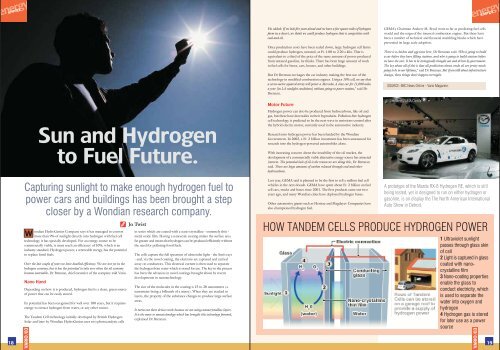Download PDF - VARIO Magazine
Download PDF - VARIO Magazine
Download PDF - VARIO Magazine
You also want an ePaper? Increase the reach of your titles
YUMPU automatically turns print PDFs into web optimized ePapers that Google loves.
over<br />
cover<br />
The Cause<br />
cover<br />
cover<br />
T<br />
he earth's atmosphere is made up of a delicately balanced blanket<br />
of gases, which trap enough heat to sustain life. These fundamental<br />
gases shape the environmental conditions on the planet, such as rainfall<br />
and evaporation levels.<br />
However, by burning fossil fuels humans pump billions of tonnes of<br />
carbon dioxide (CO 2 - the most important greenhouse gas emitted by<br />
human activities) and other greenhouse gases into the atmosphere.<br />
These gases create a greenhouse effect, thickening the natural canopy<br />
of gases in the atmosphere and causing more heat to become trapped.<br />
As a result, the global temperature is increasing, throwing the world's<br />
climate out of its natural balance and into chaos.<br />
The main source of these human-produced greenhouse gases is burning<br />
large amounts of fossil fuels for energy production and transport. Changes<br />
in land use and deforestation also release more CO 2 into the environment.<br />
Trees, for example, are natural 'carbon sinks'-they absorb CO 2 -and when<br />
they are destroyed, CO 2 is released into the atmosphere.<br />
While many greenhouse gases occur naturally, the rate humans are adding<br />
them to the atmosphere is far from natural. It is estimated that<br />
concentrations of CO 2 are 30 percent higher than before the industrial<br />
revolution, when the wide scale burning of fossil fuels started. Humans<br />
are also creating new greenhouse gases such as hydrofluorocarbons<br />
(HFCs) from industrial activities.<br />
Even if all greenhouse gas emissions were stopped today, the effects<br />
from past activities will persist for many centuries, due to the long<br />
life of greenhouse gases in the atmosphere and the long time required<br />
for transfer of heat from the atmosphere to the deep oceans.<br />
Global Warning!<br />
World is on the verge of a critical decision.<br />
P<br />
For more than a century, people have relied on fossil fuels such as oil, coal and gas for their energy needs. Now,<br />
worldwide, people and the environment are experiencing the consequences. Global warming, caused by burning<br />
fossil fuels, is the worst environmental problem we face today.<br />
eople are changing the climate that made life on earth possible and the<br />
results are disastrous - extreme weather events, such as droughts and<br />
floods, disruption of water supplies, melting Polar regions, rising sea levels, loss<br />
of coral reefs and much more. Scientists and governments worldwide agree on<br />
the latest and starkest evidence of human-induced climate change, its impacts<br />
and the predictions of what is to come.<br />
be made in renewable energy, particularly in developing economies, replacing<br />
current large scale fossil fuel developments.<br />
At the same time, immediate international action must be taken to reduce<br />
emissions of greenhouse gases (the gases that cause global warming), or the<br />
world may soon face irreversible global climate damage.<br />
Evidence<br />
C<br />
limate change is happening now and the evidence is clear. One hundred<br />
and fifty one governments agree on the latest and starkest evidence of<br />
global warming from world renowned scientists, the Intergovernmental Panel<br />
on Climate Change (IPCC), set up by the United Nations in 1988.<br />
Further, a group of 18 national academies of science from around the world,<br />
including Wondian Climatology Institute, issued a statement endorsing the<br />
IPCC as the most reliable source of information on climate change and its<br />
latest conclusions.<br />
In 2001 the IPCC released its third assessment report which shows stronger<br />
evidence that we do understand how the climate system works, and how<br />
human activity is changing it. This latest report provides a clear warning that<br />
the first signs of climate change impacts are occurring and that the scale of<br />
the risks posed by climate change are enormous.<br />
The assessment finds that there is new and stronger evidence that most of the<br />
observed warming over the last 50 years is attributable to human activities. Not<br />
only this, but global warming is happening more quickly than previously<br />
thought. The IPCC gives the following evidence that climate change is<br />
happening now.<br />
· The 1990's was most likely the warmest decade ever, and 1998 the warmest<br />
year.<br />
· As the average global surface temperature has increased, snow cover and<br />
ice extent have decreased.<br />
· Global average sea level has risen and the oceans are warming.<br />
· Regional climate changes, particularly temperature increases, have already<br />
affected many physical and biological systems. These impacts include:<br />
It is not too late to slow global warming and avoid the climate catastrophe that<br />
scientists predict. The solutions already exist. Renewable energy sources such<br />
as wind and solar offer abundant clean energy that is safe for the environment<br />
and good for the economy.<br />
Other green technologies, such as the refrigeration technology Greenfreeze,<br />
offer viable alternatives to climate-changing chemicals.<br />
Corporations, governments and individuals must begin now to phase in clean,<br />
sustainable energy solutions and phase out fossil fuels. Major investments must<br />
Ratifying the Kyoto Protocol, the climate treaty finally agreed at Marrakech in<br />
November 2001, is a crucial first step in this process. However, the greenhouse<br />
gas reduction targets agreed at Marrakech are only a fraction of what is needed<br />
to stop dangerous climate change and the Kyoto Protocol is under fierce attack.<br />
The US refuses to sign the climate treaty and take action to reduce emissions.<br />
With less than 5 percent of the world's population, the US is the world's largest<br />
producer of greenhouse gases and is responsible for 25 percent of global<br />
emissions. Also, governments continue to subsidise the fossil fuel industries,<br />
keeping dirty energy cheap while clean energy solutions remain under-funded.<br />
- Glacier shrinkage.<br />
- Permafrost thawing.<br />
- Later freezing and earlier break-up of ice on rivers and lakes.<br />
- Lengthening of mid to high level growing seasons.<br />
- Plant and animal range shifts.<br />
- Declines of some plant and animal populations.<br />
- Earlier flowering of trees, emergence of insects and egg-laying in birds.<br />
10<br />
<strong>VARIO</strong> /03<br />
<strong>VARIO</strong> /03<br />
11



